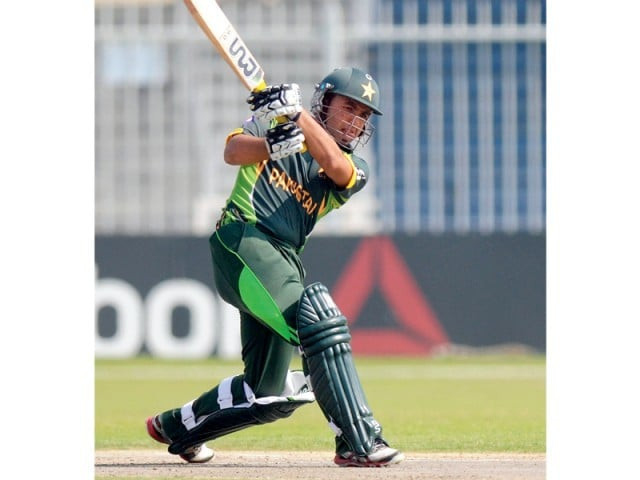Albeit our politics, our economy, our policy-making or our sports, consistency has largely been absent for a greater period of time. In sports, our teams are widely known for being painfully inconsistent and this has become our reputation in the global arena.
In the recently concluded Under-19 (U-19) World Cup, our young team proved that it hailed from the Pakistani culture, as their performance didn’t have an inch of consistency. Just like their senior counterparts, the U-19 team gave unpredictable performances throughout their matches.
In the semi-final against England, the team seemed to be in good shape and started off well. However, the Pakistani colour soon kicked in and the match became a roller coaster ride, where some team members played exceptionally well while the others seemed intent on facing defeat. Even though the team was successfully able to restrict England at a low total, when the time came to chase the score it seemed as if our young players didn’t really have a strategy to play by.
 Zia-ul-Haq picked up two wickets in the England vs Pakistan Under-19 World Cup semi-final in Dubai. Photo: ICC/File
Zia-ul-Haq picked up two wickets in the England vs Pakistan Under-19 World Cup semi-final in Dubai. Photo: ICC/FileThe chase started off brilliantly, with the likes of Imamul Haq and Saud Shakeel scoring 28 and 45 runs respectively but it soon made way for a shameful collapse, when some of the players didn’t even manage to make a single run. At one point in the match, it seemed as if defeat was inevitable for Pakistan.
However, we witnessed another twist in the match when Amad Butt, along with his partner Zafar Gohar, rescued the match and successfully chased the total. True, the team entertained spectators in the best possible way, keeping them on the edge of their seats throughout but they slacked during the match and this could have cost us our victory.
Our team needs to understand that inconsistency is not a virtue, irrespective of how entertaining it makes a match.
The final match saw Pakistan and South Africa facing each other. South Africa, a team labelled as ‘chokers’ in their previous matches, had never won any International Cricket Council (ICC) tournament – before this one.
The team started the match effectively and their performance made many people believe that Pakistan might actually win the finals. But alas, it was not meant to be, especially since our team made sure that they do not let go of their innate characteristic. Sami Aslam, Imamul Haq and, even the experienced, Hassan Raza performed poorly. Seeing them play transported me to the fiasco of the 1999 World Cup final, which was uncannily similar to this match. These players repeated history and the entire team was out at a disgraceful score of 131.
 The South African team poses after winning the U-19 World Cup 2014. Photo: AFP
The South African team poses after winning the U-19 World Cup 2014. Photo: AFPSeeing their match, it won’t be an exaggeration to say that we gifted the trophy to the South Africans, who were ecstatic to receive it for the very first time.
The Pakistan Cricket Board is also to be blamed for this disappointing performance. Almost every year, we watch talented youngsters playing their hearts out, performing amazingly well and producing great results for the team. We find the best run-scorers and leading wicket-takers. But owing to corruption in the PCB and a lack of any systematic route for entry into the national squad, these players are never selected and keep on playing at junior levels.
As a result, they become disheartened and lose passion for the game. Especially when some of their colleagues, who are not as good, end up being selected to represent the senior team, just because they know influential people.
Selecting successful U-19 players is always better for any national team. And those countries which support their young cricketers go a long way. Take Umar Akmal and Virat Kohli, for example.
Umar Akmal recently scored his second One Day International century and he has been on the team since 2009. On the other hand, Virat Kohli has equalised the number of centuries of the great Brian Lara and is also the fastest to complete 19 centuries, breaking Chris Gayle’s record. Both Umar Akmal and Virat Kohli are by-products of U-19 cricket yet the difference between the two is evident.
 Virat Kohli (R) and Umar Akmal (L)
Virat Kohli (R) and Umar Akmal (L)Their records convey a lot about our policies and the lack of systematic structure in the PCB.
Apart from Kohli, Shikhar Dhawan, Suresh Raina, Ambati Rayudu and many other top-scoring Indian players caught the selectors’ attention with their performances during U-19 World Cups. However, in our country, these youngsters are largely ignored by the PCB and as soon as they cross the age of 19, their existence for the selectors ceases to exist. Such behaviour can never harness potential players for the team.
We are a nation where personal likes and dislikes overcome merit. We need to change our behaviour, make the selection criteria more systematic, giving heed to merit, if we ever wish to produce successful results.



COMMENTS
Comments are moderated and generally will be posted if they are on-topic and not abusive.
For more information, please see our Comments FAQ